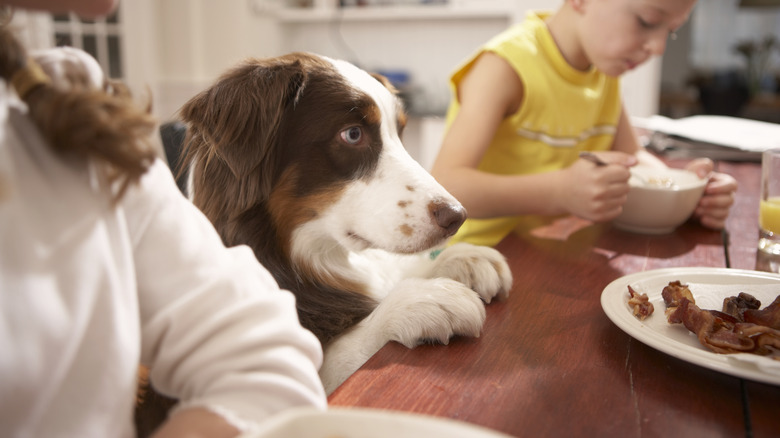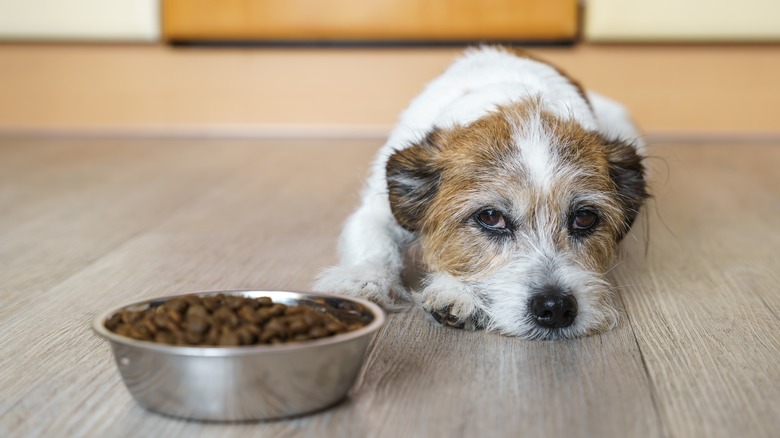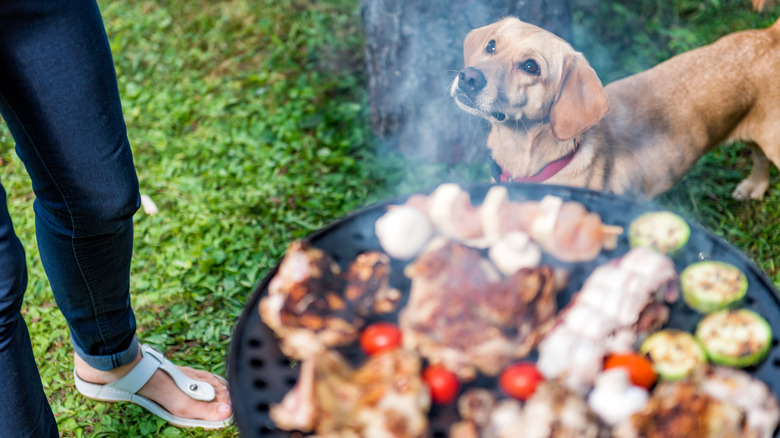How Often Can You Feed Your Dog Bacon As A Treat? Here's What You Should Know
Dogs and humans alike can barely resist a sizzling, salty, savory strip of bacon. But can your pup brunch in style with you and partake in this treat? Canines are omnivores, — your dog's food very likely contains some sort of animal protein — and bacon is meat! But bacon is cured and heavily processed (yes, even "uncured" bacon is cured), making it a food you should avoid giving your pup if at all possible, as Dr. Danielle Rutherford, VMD, shared with Chewy.
Bacon itself isn't considered toxic to dogs — if you drop a small piece on the ground and Fido gobbles it up before you can get to it, don't panic. But you shouldn't purposely feed smoked or cured meats to your dog, even on an occasional basis. There are several risks to giving your dog bacon from your plate, and even more if they get their paws on a strip of raw bacon. The best and only way your dog should enjoy this particular food is in bacon-flavored dog treats.
Why bacon is dangerous for dogs
It's no secret that nitrate-cured meat isn't the healthiest choice for humans, and the dangers to us, which include an increased cancer risk, may also apply to your pooch. Bacon is also extremely high in sodium, and super salty foods are not a good idea for dogs, especially those with heart issues, per PetMD. When dogs get way too much sodium, it can lead to a life-threatening condition called sodium ion poisoning, according to Dr. Danielle Rutherford.
Another thing bacon has a lot of is fat. Dogs who consistently eat very fatty foods (like bacon) have an increased risk of developing pancreatitis. The fat in cured pork, along with the preservatives added to many varieties, can lead to gastrointestinal distress, which is never fun, either.
Bacon is sometimes chewy and stringy, so it can also pose a choking hazard for your pup, especially if they get a larger piece. And raw bacon can harbor parasites or bacteria that can lead to foodborne illnesses. If your pup got into your bacon stash and ate more than a small nibble, keep your eye out for the signs that something is wrong highlighted by Dr. Rutherford, like vomiting, diarrhea, a lack of appetite, or lethargy. If you notice any of those symptoms, give your vet a call.
Can dogs have other types of pork?
Okay, so bacon is out. But what about other kinds of pork? The American Kennel Club (AKC) identified plain, cooked, and uncured pork as safe for most dogs to eat in moderation. But once you add flavor to it, beware. Things like onion powder and garlic powder are toxic to pups, and sauces often contain ingredients that aren't healthy for them as well, such as sugar, salt, and other spices.
Tough pork chops can be a choking hazard, and you never want to give your dog a pork bone after you finish your ribs — cooked animal bones can easily break as your pup chews on them, and swallowing sharp bits of bone can lead to very serious problems for their digestive tract, including blockages, bleeding, and puncture wounds. If you're going to cook bones for your dog, you have to do it correctly.
When introducing pork to your dog, AKC recommends starting with a small taste. This type of meat is generally fatty, so you want to make sure your pup's system can handle it before you let them chow down on a bigger piece. Allergic reactions to pork are also not unheard of in dogs. In short, it's best to proceed with caution when feeding pork to your pet, and avoid the cured stuff as much as possible. However, don't worry too much if they sneak a little bite of bacon once in a while.


